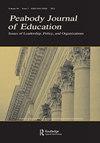Shaping Minds or Defending Democracy? How Scholars Have Interpreted Major Reports on Higher Education From the 1940s
Q2 Social Sciences
引用次数: 0
Abstract
ABSTRACT In the 3 years prior to Harry Truman’s establishment of the President’s Commission on Higher Education in 1946, the Association of American Colleges (AAC), the American Council of Learned Societies (ACLS), and Harvard University all released reports on the relationship of general or liberal education to the political order. This historiographical essay assesses recent scholarship on these major reports of the 1940s by scholars including Jamie Cohen-Cole, Andrew Jewett, Bryan McAllister-Grande, George Marsden, and Louis Menand. The essay examines why intellectual historians have often given more attention to the Harvard “Redbook” than to the Truman report and why they have almost completely ignored the book-length ACLS report (the AAC report was much smaller but also gets little attention). I argue that intellectual historians’ greater attention to the Redbook is largely due to its singular focus on general education (as compared to the more wide-ranging Truman report) and to the greater ease of accessing archival records of the Harvard committee as compared to the Truman Commission. I also assert that some key interpreters have misunderstood the Harvard Redbook and its relationship to the Truman report. Correctly understanding the differences between the two helps us to see that distinct intellectual positions underpinned competing visions for undergraduate education in the United States after World War II.塑造思想还是捍卫民主?学者如何解读20世纪40年代以来有关高等教育的主要报告
在1946年杜鲁门总统成立高等教育总统委员会之前的三年里,美国大学协会(AAC)、美国学术团体理事会(ACLS)和哈佛大学都发布了关于普通教育或自由教育与政治秩序关系的报告。这篇史学论文评估了最近学者对20世纪40年代这些主要报告的研究,这些学者包括杰米·科恩-科尔、安德鲁·朱伊特、布莱恩·麦卡利斯特-格兰德、乔治·马斯登和路易斯·梅南德。这篇文章探讨了为什么知识渊博的历史学家往往比杜鲁门的报告更关注哈佛的“红皮书”,以及为什么他们几乎完全忽视了像书一样长的ACLS报告(AAC的报告要小得多,但也很少受到关注)。我认为,知识分子历史学家对红皮书的更多关注主要是因为它对通识教育的单一关注(与更广泛的杜鲁门报告相比),以及与杜鲁门委员会相比,更容易获取哈佛委员会的档案记录。我还断言,一些关键的解释者误解了哈佛红皮书及其与杜鲁门报告的关系。正确理解两者之间的差异有助于我们认识到,二战后,不同的知识分子立场支撑着美国本科教育的竞争愿景。
本文章由计算机程序翻译,如有差异,请以英文原文为准。
求助全文
约1分钟内获得全文
求助全文
来源期刊

Peabody Journal of Education
Social Sciences-Education
CiteScore
2.20
自引率
0.00%
发文量
43
期刊介绍:
Peabody Journal of Education (PJE) publishes quarterly symposia in the broad area of education, including but not limited to topics related to formal institutions serving students in early childhood, pre-school, primary, elementary, intermediate, secondary, post-secondary, and tertiary education. The scope of the journal includes special kinds of educational institutions, such as those providing vocational training or the schooling for students with disabilities. PJE also welcomes manuscript submissions that concentrate on informal education dynamics, those outside the immediate framework of institutions, and education matters that are important to nations outside the United States.
 求助内容:
求助内容: 应助结果提醒方式:
应助结果提醒方式:


